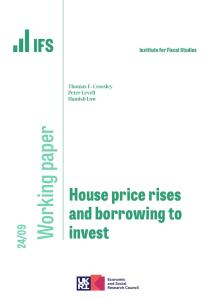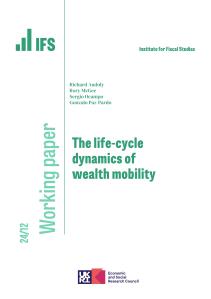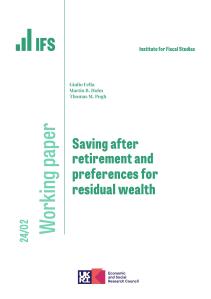We are constantly being lectured about how we should save more for our retirements. Maybe we should. But what happens next? It’s all very well having assets when you get to retirement age, but that still leaves another 20 years or more to manage and make use of them. How we do that can have as much impact on living standards in retirement as the amount saved in the first place.
A new report from my colleagues at the Institute for Fiscal Studies suggests that many of the assets that people retire with are still with them 30 years later. They live on their pensions — state and private — but neither use much of their savings nor unlock their housing equity. We put all that effort into accumulating assets and then fail to spend them.
The facts are striking. Take housing. Something like 80 per cent of the over-50s are homeowners. For most, the majority of their non-pension wealth is locked up in their house. There is wealth there that could be used to help to fund retirement, but it very rarely is. More than half of homeowners do not move at all after the age of 50. Given that most will live another 30 years or more, that’s a remarkable degree of immobility. Even those that do move rarely do so for financial reasons.
Even second homes don’t tend to get sold; and there are an awful lot of them. One in six of those between the ages of 55 and 64 owns a second home. Based on the behaviour of their predecessors, most of them will still own it at death.
Nor does financial wealth seem to get spent. Those in their late 50s and early 60s have an average of about £80,000 in financial assets — cash, ISAs, shares etc. Again, the behaviour of slightly older groups suggests that they will still have the majority of that cash 30 years later.
One driver of this behaviour may be fear of the costs of social care towards the end of life. The combination of a lack of a private insurance market and lack of public provision could lead people to save money just in case. If that is what is happening, it is incredibly inefficient and potentially very damaging to the wellbeing of those concerned. Only a small minority end up facing significant costs associated with care. But, of course, the risk is there for everyone, so it may well be that lots of older people are saving money to pay for costs that more likely than not will never materialise. Which is just another way of saying that the failure of government to deal with social care policy remains staggeringly costly and damaging.
Whatever the reason for the way in which people hold on to their wealth right through retirement, it has some far-reaching consequences.
The first is the way that this affects the housing market. If family homes aren’t sold, then they won’t be available to the next generation looking for somewhere to bring up their families. And the remarkable prevalence of second home ownership among the older generation is the flipside of high levels of renting among younger people. They are renting from somebody and that somebody is often a member of their parents’ generation.
An effective housing policy should not only ensure that more houses are built, it also should move away from the present absurd situation that, for example through stamp duty, encourages people to stay put. The costs and hassle of moving are enough to make the housing market overly sticky. Government should be acting to ungum it, not gum it up even further.
Second, if wealth doesn’t get spent, it gets bequeathed. Wealth is held very unequally, so it gets bequeathed very unequally. And the amount being bequeathed is rising over time. That said, because wealth doesn’t tend to be left to younger generations until both parents are dead, and because life expectancy has increased so much, recipients are often in their 60s by the time they actually inherit. And it remains the case that most bequests are left to children rather than skipping a generation and being left directly to grandchildren.
Third, this pattern of behaviour also raises some rather big questions about the future. We are moving away from traditional pension provision in the private sector to personal pension pots that can be drawn on like any other savings. There is no longer any requirement to annuitise. So an increasing fraction of the wealth held by retirees will look like the kind of financial assets people currently don’t seem to feel comfortable using. Most of the concerns raised about so-called pension freedoms have focused on the possibility that people will blow their pension pots on cruises or Lamborghinis. Much of the evidence about people’s actual behaviour has led many of us economists to be more worried about exactly the reverse: a lot of people might well underspend and not enjoy the standard of living that they could actually afford.
Of course the future won’t be like the past. With no private pension income to live on, people will have to treat their other assets differently. When you ask them, they are quite likely to say that they will use their savings and housing wealth to fund their retirement. They’ll need to. And the government and the financial services industry need to move on from merely lecturing people about how much they should save. They urgently need to make sure that we have a set of policies and products, in pensions, housing and social care, which allows people to manage their assets sensibly and which avoids creating long-term problems for future generations.
Paul Johnson is director of the Institute for Fiscal Studies. Follow him on @PJTheEconomist









